theartsdesk Q&A: Mezzo Anne Sofie von Otter | reviews, news & interviews
theartsdesk Q&A: Mezzo Anne Sofie von Otter
theartsdesk Q&A: Mezzo Anne Sofie von Otter
Most elegant and eclectic of singers on new operas and fresh collaborations
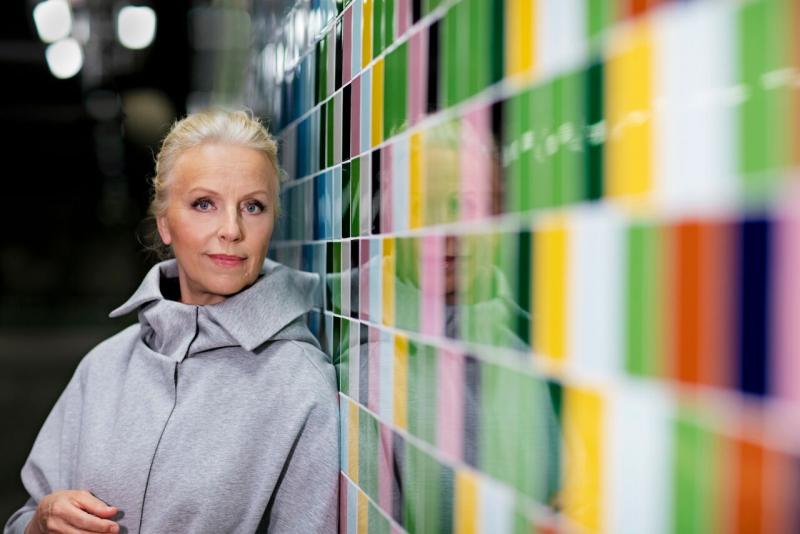
What's a world-renowned mezzo-soprano in her middle years to do? Slimline of voice, tall and handsome in person with piercing and slightly intimidating blue eyes, Stockholm-born Anne Sofie von Otter isn't likely to sing what is known in the operatic world as "all those old bag parts", though she's a good enough actress to have carried off a few.
Yet this is one of the widest-ranging and most recorded voices of the past 25 years (over 100 CDs to date). From Mozart's Idamante and Sesto in ground-breaking 1990 concert performances to a grande dame in meltdown as part of Thomas Adès's superb ensemble in The Exterminating Angel at Salzburg this summer, her operatic gamut isn't exhausted yet. And in more recent times, she's initiated a whole series of thoughtfully planned compilations with ever-surprising sources and collaborators.
The latest, reviewed today by Graham Rickson, is So Many Things with the iconoclastic string quartet Brooklyn Rider. That was naturally the core of our conversation, but I started with chat about the Salzburg experience of The Exterminating Angel, which arrives at the Royal Opera next year and which she immediately acclaimed as "a fantastic opera... I did become a big, big fan of Thomas Adès".
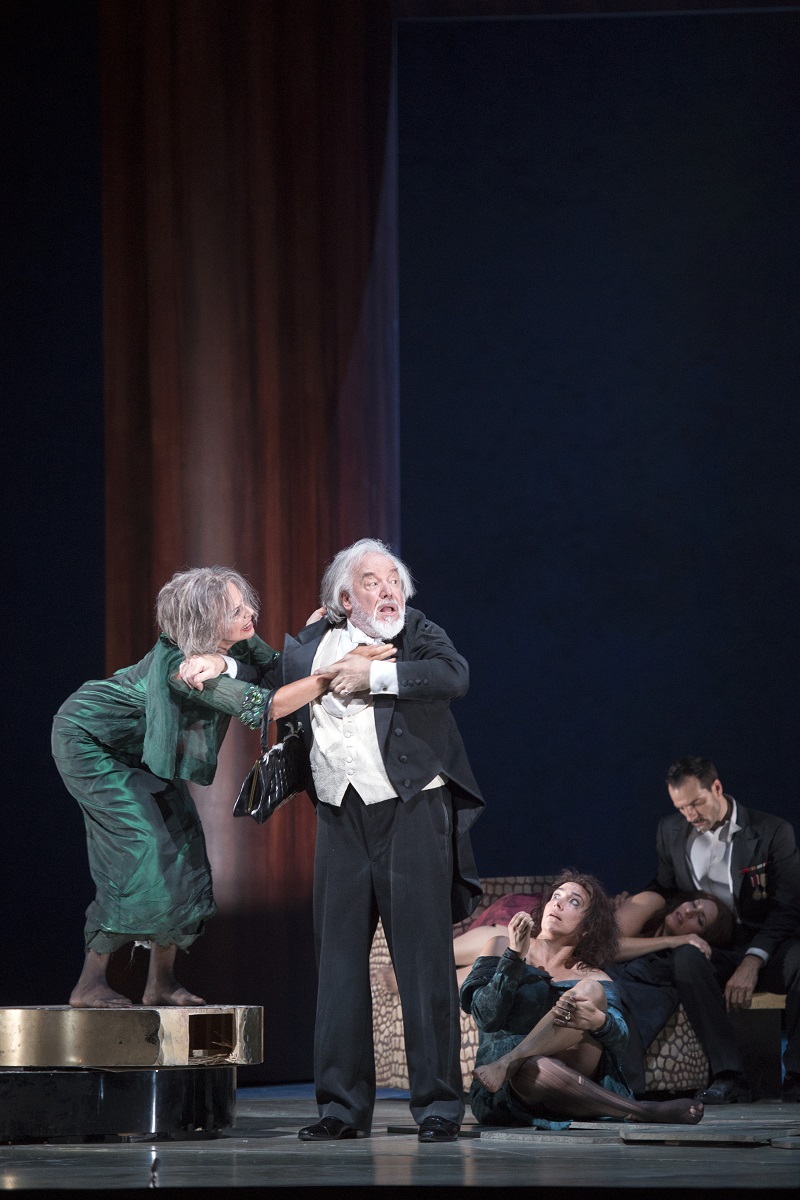 DAVID NICE: Did the role sit well for you? [von Otter pictured right with John Tomlinson by Monika Forster]
DAVID NICE: Did the role sit well for you? [von Otter pictured right with John Tomlinson by Monika Forster]
ANNE SOFIE VON OTTER: Yes, it's a weird role with very low tessitura with screeches and screams, but it's a fun role, interesting maybe is the word. Some of the parts were very extreme, they were very high -
- several of the soprano parts -
Yes. Mine was low, I've never sung so low a role, with such a lot of speak-singing. For me it wouldn't work to sing it with a nice tone, he's after something completely different. Or so I think, and he didn't contradict me. It was great, I really enjoyed it.
What interested me was how Adès sets words, which can be deliberately uncomfortable, in marked contrast to some of the word-settings on the new disc. I thought Muhly sets words beautifully [in the Cavafy sequence the collective title of which is also the disc's]. Would you agree?
Yes. That's a very clever composer, one where things move at the speed of light, and he's got it all there, he just opens the doors like Tom Adès can, and I've sung that piece a lot now. I've sung it with Manny [Emanuel] Ax because it was in a different programme to begin with, and I've also done it with [fellow Swede pianist] Bengt Forsberg and [Finnish violinist] Pekka Kuusisto playing a little part that Nico organised, and now we've done it this way, and it's a good piece. It gets something going and he creates an atmosphere, because of the quick de-de-de-de patterns going on in the instruments, it has its personality and it seems to work very well.
He wrote it specifically for you.
Yes.
So did you have a dialogue about how it would be?
No. He said, "Would you agree to these texts?" And then I probably said something about my tessitura. But he is such a clever guy so, no, there wasn't a lot of discussion. He'd written for singers before.
It's a relative rarity for me among contemporary composers, the ones who really set words like speech-melody. Obviously someone like Adès or Gerald Barry doesn't want that, they have different values, but it must be gratifying for you when pieces sit...
... like you speak them? Definitely. Actually I thought Tom Adès did, at least for my part, do that. Another new opera I'm doing [see below], it's the same thing there, but other pieces I've done where they're drawn out [long aaaaaa yuuuu sounds] because the composers like the sound and they think the voice is an instrument. Which it is, in a way, but it's just very tiring to sing like that, and no one can get the sense of the words if it's set like that.
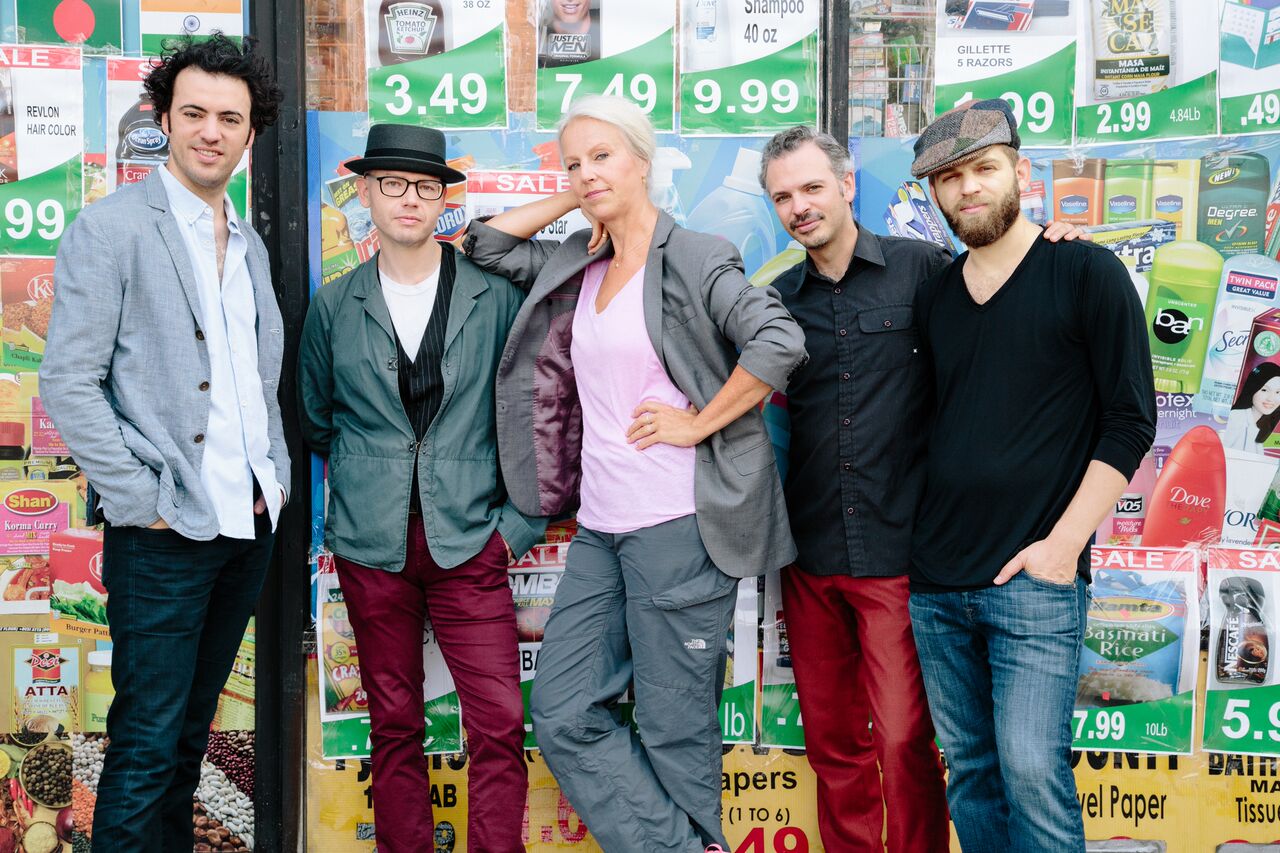
The way this is programmed, it's a beautiful sequence. Did you work on that with the string players [all five participants pictured above by Erin Balano] or do you decide exactly how you want the sequence to be?
There was a lot of to-ing and fro-ing. I want to get it right, I want it to sell so that people listening to the first song for 10 seconds need to be drawn in, and also in years gone by, I used to think, save the really good tune until last, but that's not good, because most people have stopped listening by that time, somebody told me, and that's probably true. My personal taste is to vary the sound worlds and the speed, but the person I was talking to in the quartet liked it when you have songs together that have the same world, so who's going to come out of that as the winner? And then we also had the help, which was good, of the producer Kevin Killen; he had ideas too, but this went on for several weeks, and then we did an order, and they rebalanced off that, and then we listened again, did some final tweaks, so that's a big procedure. It's very hard. In the end your head just spins and you don't want to hear them any more.
And you didn't sing them straight through in the studio in the order they appear on the disc?
No.
So it feels like a different process, and from what you're saying it's very different putting the songs together for the CD from doing a recital where you do want to save the 11 o'clock number for its rightful place.
Exactly. And also think, what's the voice going to feel like as you go through? Also we decided in concert to separate the unamplified from the amplified, because for the audience to hear my voice through loudspeakers and then not through loudspeakers can be confusing. In some halls it can work if you have a very clever engineer. But anyway, now we have the stuff without amplification before the interval.
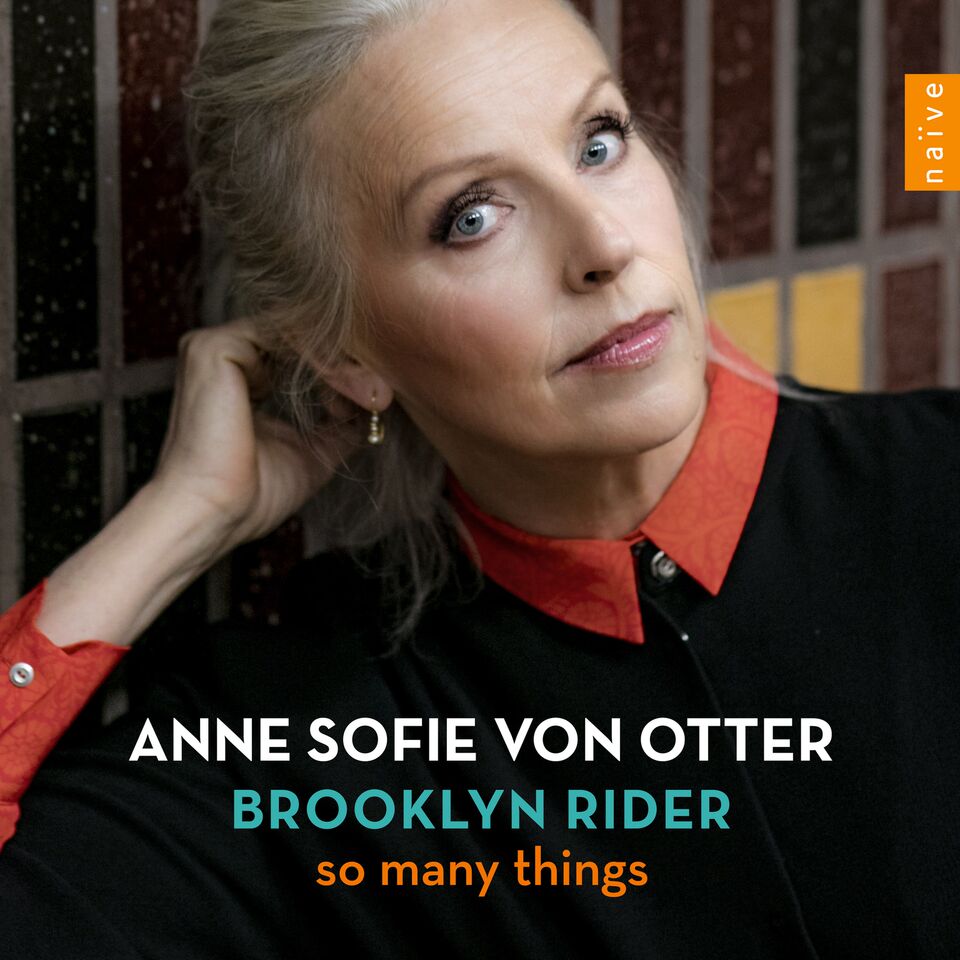 I love the two Björk songs, were those the ones that struck you the most when you listened to her?
I love the two Björk songs, were those the ones that struck you the most when you listened to her?
I like many others as well, but not many Björk songs work for me. Those did in the arrangements.
Because you're challenging a very singular kind of voice?
Very different, yes, and sometimes she does a lot of screeching and wailing, and I can't do that, and there are too many electronic effects that make the track, and we didn't have that. So I had maybe a list of six songs that I like, and Nick Cords in the quartet was my partner for this, so he would listen too and then went on to the arrangers that he liked - we had Vince Mendoza for one of them, so he got to say what he thought as well.
But you're pleased with the result?
Yes. There was one ["Hunter"] that was very hard to get the sound right for, because I wasn't happy with what I had sung, so we had the idea to do the distortion and there was a lot of fiddling with that. But the end result is good.
You've done so many of these discs which make a satisfying whole and go places that a lot of other recitals don't, partly through Bengt Forsberg and working with other musicians - the Theresienstadt disc and concerts you must be very proud of.
 Yes, I am. I was very lucky to meet Bengt and to have this fantastic musical relationship with him, and the conductors I've worked with as well, of course, but then when I was thinking of working outside Bengt, I was listening to Brad Mehldau on the radio and I thought, wow - and I'm very grateful that I got to do the project with him. And Costello, of course. Not every person you admire as an artist you can work with, or there's no point, or you don't quite understand each other, or they're too busy or you're too busy, but in some cases you really seem to hit it off. So people I haven't known before like Leonardo García-Alarcón, who I did the baroque disc with, was a wonderful collaborator because he was also very open to trying different things, and Brad is not open in that way, but he's such a genius when he plays, so that was fantastic, and the songs were very good that he wrote. This is a very good collaboration too, when we do our concerts, it feels right.
Yes, I am. I was very lucky to meet Bengt and to have this fantastic musical relationship with him, and the conductors I've worked with as well, of course, but then when I was thinking of working outside Bengt, I was listening to Brad Mehldau on the radio and I thought, wow - and I'm very grateful that I got to do the project with him. And Costello, of course. Not every person you admire as an artist you can work with, or there's no point, or you don't quite understand each other, or they're too busy or you're too busy, but in some cases you really seem to hit it off. So people I haven't known before like Leonardo García-Alarcón, who I did the baroque disc with, was a wonderful collaborator because he was also very open to trying different things, and Brad is not open in that way, but he's such a genius when he plays, so that was fantastic, and the songs were very good that he wrote. This is a very good collaboration too, when we do our concerts, it feels right.
Have these artists affected the way you thought about that repertoire? First from listening, but then when you actually worked together, has it developed you as an artist, for want of a better phrase?
Well, I didn't know exactly what it would be like to sing with this particular quartet, and what they can do, and what they can't do, but particularly what they can - they have a very modern way of playing, they're not like your usual quartet, it's a different way, you need to do it and knead yourselves together and rehearse and - tune in, thank you, but I'd heard their recordings so I knew a little bit what they were about, but it's still different when you meet. They were just right for this project.
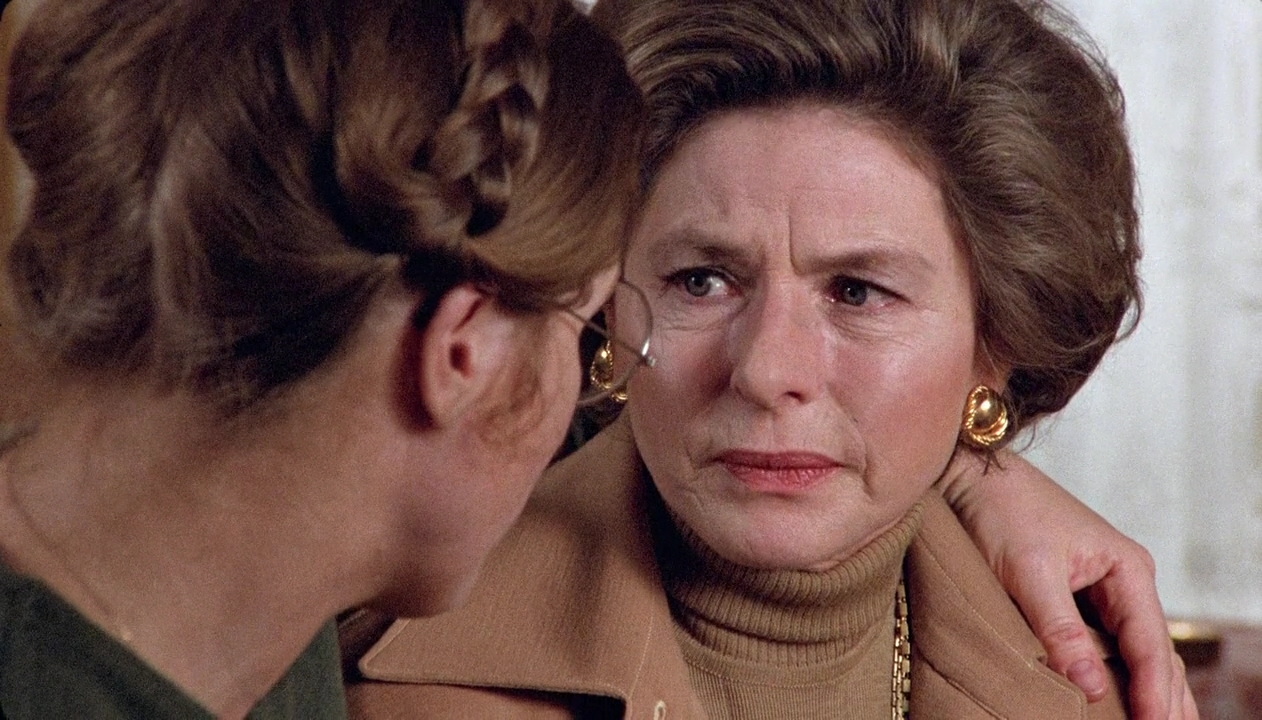
The new opera you mentioned is Sebastian Fagerlund's latest project, isn't it, based on Ingmar Bergman's Autumn Sonata, it's one of his greatest.
It's a fantastic film. And Ingrid Bergman [pictured above in the film with Liv Ullmann] is so good in it, and now I'm to play - you want to say, I'm playing the role of Ingrid Bergman, which I'm not.
And yet Bergman said he incorporated elements of her personality into the part.
I'm sure he did.
But then it was a case of stripping her bare and trying to get rid of the artifice.
Exactly. It'll be hard for me. I must not see the film again before we start rehearsing, because I must try and do something separate from what she does. That'll be a challenge.
Who's singing the Liv Ullmann role of the daughter?
Erika Sunnegårdh.
The relationship you develop will be more or less a two-hander?
Well, there's also the handicapped daughter who also is in the music a fair amount, and the husband of Liv Ullmann's character, and a choir, a Greek chorus who comments - it's not an easy piece to do.
You know Fagerlund's style already?
I've listened to some of his stuff but I can't say I know his style very well. It's fairly modernistic.
Has much been written?
It's finished, all done. Have you heard much of his music?
A couple of works for bassoon and orchestra, which I rather liked.
He has a very good reputation so I'm keeping my fingers crossed. I got the score while I was in Salzburg, where I also had Thomas Adès's piano score, which is so full of things roaring around, it's black with notes, and the Fagerlund score is not like that at all. Just because I loved Adès's piece so much I hope Fagerlund's piece gets the juices flowing.
You're getting to sing in The Exterminating Angel at Covent Garden, but not at the Met - what's all that about?
Well, at the Met they think my voice is too small. That's what they say. It could be that they think, she's been here so often before. Alice Coote is doing it, she sings a lot there now and is obviously someone they like very much.
Also a wonderful singer. You would have thought they might have waited to see how well you did in Salzburg...
They don't want me there, because my agent keeps asking when she's there for someone else, she'll say, "How about Anne Sofie?" And they'll say, "No, no, we love her, but her voice is too small."
But you know it's a question not of size but of projection.
And I always sang there before, and my voice hasn't changed that much. So the only thing I can say is, that role is low, and the Met is big, and when I was there before I always sang high things like Idamante and Sesto and Octavian, and they are high, and it rings very nicely, so with a lower role I might have problems, it's not impossible. There's nothing to be done!
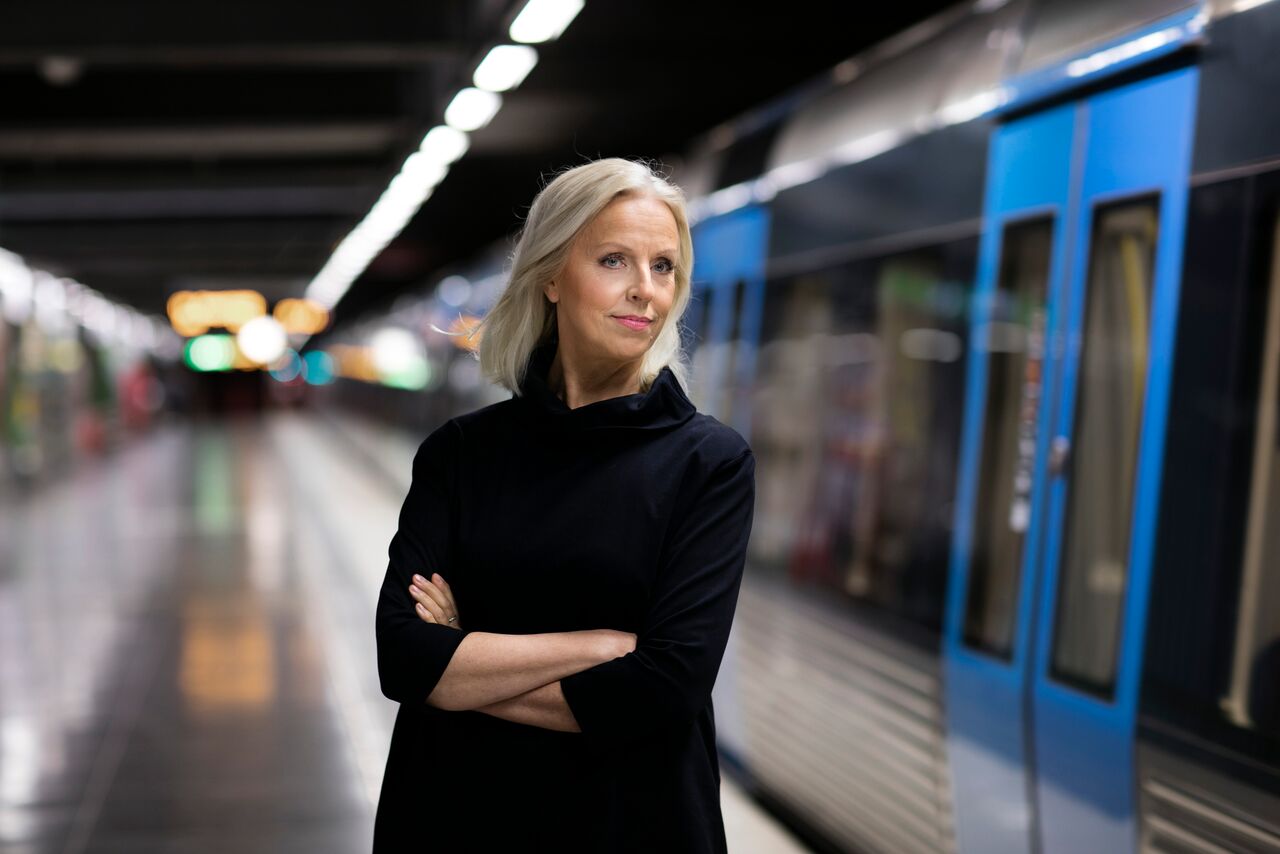
How do you feel about the present stage of your career? [Anne Sofie von Otter pictured above by Mats Bäcker]
It's very interesting to see what's happening to the voice, and I'm having to be extremely good about practising. I practise a lot and I record myself and I've started taking lessons in the States with a new teacher, a former colleague of mine, Julia Faulkner, who's getting the voice to hold it up and put it forward, an American technique, but it seems to work very well, because my voice was starting to [gives physical impression of sagging]. With age everything changes - the voice wants to go eeurgh. It's not getting darker or anything but it doesn't want to sit and ping any more, so I have to force it to. It can still do it. It needs to be disciplined. I can't just fool around with the music like I used to when I sang a song and had a good time - it was always hard work, of course, but now I have to think about my technique all the time which is a bit annoying, but there you go.
Do you find it's a mixture of shedding roles that you wouldn't sing now and wanting roles that you would still like to sing that people don't ask you to do?
There are roles that people don't think of me for, because my voice is so clean - I'd like to try and sing [the Countess in Tchaikovsky's] Pique Dame. Also I did sing Baba the Turk [in Stravinsky's The Rake's Progress] a couple of times, with some success, but it was in one house and no one else has asked me, even though I had fantastic reviews and I went back to do it - it was in Vienna, twice in the Theater an der Wien, and it went very well both times, and it's a fun role for me to act. And no one else asks. "Yes, we heard she could do it and we heard she did it well in Vienna but we don't want her to do it here." They would use a different type of singer. And this has happened so often that I've sung a role once or twice and it's gone really well, but word goes around but I don't get asked elsewhere.
People perhaps don't think outside the box.
They see that I have done [Handel's] Cornelia and Baba and various things, but they don't want me to do it because it's not my standard thing, they have a large singer or a singer with a wreck of a voice, just not my type.
There's no reason why the Countess shouldn't be sung extremely beautifully.
Exactly. And singing-wise it's a small role, so it's not as if I don't sing loud and big people will miss that, because that's for the other singers, but my character is important. Anyway, it's hard for me and people like Ann Murray who can't quite go over to Klytämnestra [in Strauss's Elektra] like Agnes Baltsa and Christa Ludwig, they could sing that because they had the heft, but us lyric mezzos it's very hard.
But a case could be made for a lyric Klytämnestra.
Yes, but maybe for that you do want someone with quite a lot of dirt in the voice, and when I put dirt into my voice it's not so comfortable. I can do it but maybe not a whole big role, it's quite a big chunk. I used to think I can do it but now I think, not worth it.
 Of this enormous discography you have, is there anything that stands out that you're proud of?
Of this enormous discography you have, is there anything that stands out that you're proud of?
Many. The fun new discoveries like [Weill's] The Seven Deadly Sins with John Eliot [Gardiner], there was the [Handel] Ariodante with Marc Minkowski which was like a passionate love affair between Marc and me with that music, you could have cut the atmosphere with a knife but in a good way. I was very proud of my Douce France which came recently where I sang French chansons. The Korngold [song sequence plus] was a success and not a straightforward one because Deutsche Grammophon were very doubtful, but the package with the chamber music, well, I'm happy they agreed to that though they were always reluctant about that sort of thing. The two Mozart operas with John Eliot.
That was historically such a groundbreaker. It was the first time a lot of listeners had heard them like that with period-instrument bite, and back to back in the Queen Elizabeth Hall.
And he'd prepared it all so well, there were tours, he does things the right way time and again. That's the ideal way to work.
Explore topics
Share this article
The future of Arts Journalism
You can stop theartsdesk.com closing!
We urgently need financing to survive. Our fundraising drive has thus far raised £49,000 but we need to reach £100,000 or we will be forced to close. Please contribute here: https://gofund.me/c3f6033d
And if you can forward this information to anyone who might assist, we’d be grateful.

Subscribe to theartsdesk.com
Thank you for continuing to read our work on theartsdesk.com. For unlimited access to every article in its entirety, including our archive of more than 15,000 pieces, we're asking for £5 per month or £40 per year. We feel it's a very good deal, and hope you do too.
To take a subscription now simply click here.
And if you're looking for that extra gift for a friend or family member, why not treat them to a theartsdesk.com gift subscription?

Add comment